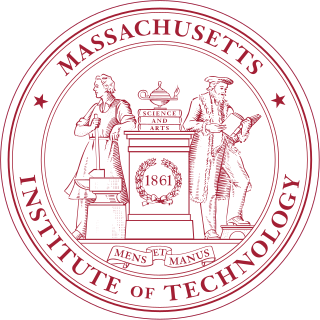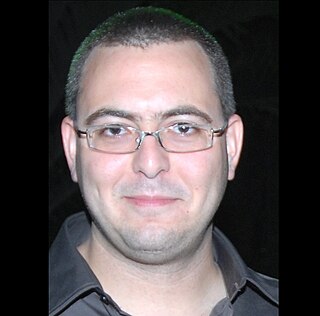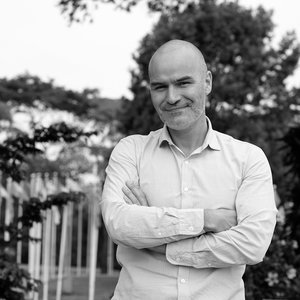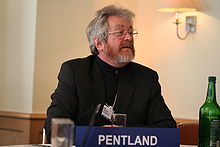
The Massachusetts Institute of Technology (MIT) is a private land-grant research university in Cambridge, Massachusetts. Established in 1861, MIT has played a significant role in the development of many areas of modern technology and science.

The MIT Media Lab is a research laboratory at the Massachusetts Institute of Technology, growing out of MIT's Architecture Machine Group in the School of Architecture. Its research does not restrict to fixed academic disciplines, but draws from technology, media, science, art, and design. As of 2014, Media lab's research groups include neurobiology, biologically inspired fabrication, socially engaging robots, emotive computing, bionics, and hyperinstruments.

Computer Science and Artificial Intelligence Laboratory (CSAIL) is a research institute at the Massachusetts Institute of Technology (MIT) formed by the 2003 merger of the Laboratory for Computer Science (LCS) and the Artificial Intelligence Laboratory. Housed within the Ray and Maria Stata Center, CSAIL is the largest on-campus laboratory as measured by research scope and membership. It is part of the Schwarzman College of Computing but is also overseen by the MIT Vice President of Research.

Cynthia Breazeal is an American robotics scientist and entrepreneur. She is a former chief scientist and chief experience officer of Jibo, a company she co-founded in 2012 that developed personal assistant robots. Currently, she is a professor of media arts and sciences at the Massachusetts Institute of Technology and the director of the Personal Robots group at the MIT Media Lab. Her most recent work has focused on the theme of living everyday life in the presence of AI, and gradually gaining insight into the long-term impacts of social robots.
Microsoft Research (MSR) is the research subsidiary of Microsoft. It was created in 1991 by Richard Rashid, Bill Gates and Nathan Myhrvold with the intent to advance state-of-the-art computing and solve difficult world problems through technological innovation in collaboration with academic, government, and industry researchers. The Microsoft Research team has more than 1,000 computer scientists, physicists, engineers, and mathematicians, including Turing Award winners, Fields Medal winners, MacArthur Fellows, and Dijkstra Prize winners.

Simson L. Garfinkel is the chief scientist of BasisTech in Somerville, Massachusetts. He was previously a program scientist at AI2050, part of Schmidt Futures. He has held several roles across government, including a Senior Data Scientist at the Department of Homeland Security, the US Census Bureau's Senior Computer Scientist for Confidentiality and Data Access and a computer scientist at the National Institute of Standards and Technology. From 2006 to 2015, he was an associate professor at the Naval Postgraduate School in Monterey, California. In addition to his research, Garfinkel is a journalist, an entrepreneur and an inventor; his work is generally concerned with computer security, privacy and information technology.

Marc Rotenberg is president and founder of the Center for AI and Digital Policy, an independent non-profit organization, incorporated in Washington, D.C. Rotenberg is the editor of The AI Policy Sourcebook, a member of the OECD Expert Group on AI, and helped draft the Universal Guidelines for AI. He teaches the GDPR and privacy law at Georgetown Law and is coauthor of Privacy Law and Society and The Privacy Law Sourcebook (2020). Rotenberg is a founding board member and former chair of the Public Interest Registry, which manages the .ORG domain.
Kent Larson is an architect and principal research scientist at the Massachusetts Institute of Technology. Larson is currently director of the City Science research group at the MIT Media Lab, and co-director with Lord Norman Foster of the Norman Foster Institute on Sustainable Cities based in Madrid. His research is focused on urban design, modeling and simulation, compact transformable housing, and ultralight autonomous mobility on demand. He has established an international consortium of City Science Network labs, and is a founder of multiple MIT Media Lab spin-off companies, including Ori Living and L3cities.
The MIT Center for Collective Intelligence (CCI) is a research center at the Massachusetts Institute of Technology, headed by Professor Thomas W. Malone, that focuses on the study of collective intelligence.
Living labs are open innovation ecosystems in real-life environments using iterative feedback processes throughout a lifecycle approach of an innovation to create sustainable impact. They focus on co-creation, rapid prototyping & testing and scaling-up innovations & businesses, providing joint-value to the involved stakeholders. In this context, living labs operate as intermediaries/orchestrators among citizens, research organisations, companies and government agencies/levels.
Philip E. Agre is an American AI researcher and humanities professor, formerly a faculty member at the University of California, Los Angeles. He is known for his critiques of technology. He was successively the publisher of The Network Observer (TNO) and The Red Rock Eater News Service (RRE). TNO ran from January 1994 to July 1996. RRE, an influential mailing list he started in the mid-1990s, ran for around a decade. A mix of news, Internet policy and politics, RRE served as a model for many of today's political blogs and online newsletters.

William John Mitchell was an Australian-born author, educator, architect and urban designer, best known for leading the integration of architectural and related design arts practice with computing and other technologies.

Nathan Eagle is an American technology executive. He is best known as the CEO and co-founder of Jana, a company that subsidizes mobile internet access in emerging markets. He has also served as a professor at both Harvard University and the Massachusetts Institute of Technology.

Latanya Arvette Sweeney is an American computer scientist. She is the Daniel Paul Professor of the Practice of Government and Technology at the Harvard Kennedy School and in the Harvard Faculty of Arts and Sciences at Harvard University. She is the founder and director of the Public Interest Tech Lab, founded in 2021 with a $3 million grant from the Ford Foundation as well as the Data Privacy Lab. She is the current Faculty Dean in Currier House at Harvard.

Rana el Kaliouby is an Egyptian-American computer scientist. She is the co-founder, with Rosalind Picard, and CEO of Affectiva.

Yaniv Altshuler, is an Israeli computer scientist and entrepreneur. He is a researcher at the MIT Media Lab, at the Human Dynamics group headed by professor Alex Pentland.
Data-Pop Alliance is a non-profit think tank founded by the Harvard Humanitarian Initiative, MIT Media Lab and the Overseas Development Institute. Emmanuel Letouzé is Director and Co-Founder and Alex Pentland is Academic Director. Its research areas includes public policy, inequality, privacy, crime, climate change and human rights.
Rediet Abebe is an Ethiopian computer scientist working in algorithms and artificial intelligence. She is an assistant professor of computer science at the University of California, Berkeley. Previously, she was a Junior Fellow at the Harvard Society of Fellows.

James M. Manyika is a Zimbabwean-American academic, consultant, and business executive. He is known for his research and scholarship into the intersection of technology and the economy, including artificial intelligence, robotics automation, and the future of work. He is Google's first Senior Vice President of Technology and Society, reporting directly to Google CEO Sundar Pichai. He focuses on "shaping and sharing" the company's view on the way tech affects society, the economy, and the planet. In April 2023, his role was expanded to Senior Vice President for Research, Technology & Society and includes overseeing Google Research and Google Labs and focusing more broadly on helping advance Google’s most ambitious innovations in AI, Computing and Science responsibly. He is also Chairman Emeritus of the McKinsey Global Institute.

Emmanuel Letouzé is a French development economist, economic demographer and political cartoonist who focuses on data and development and the author of the United Nations Global Pulse White Paper "Big Data for Development" in 2012.













